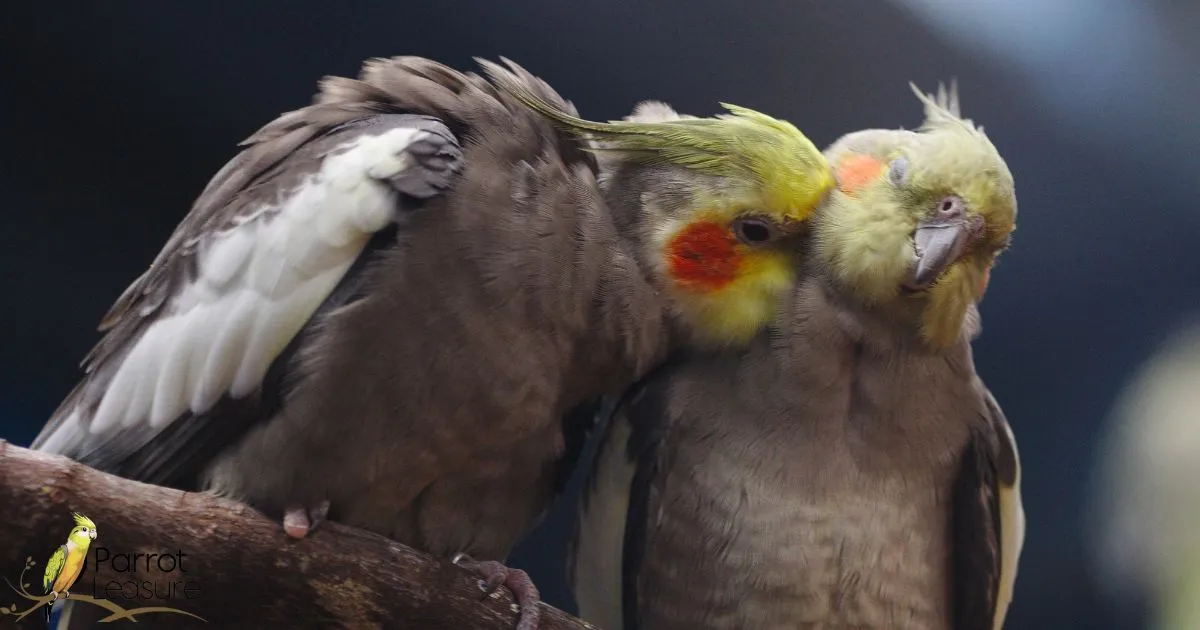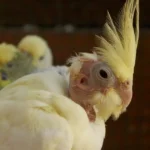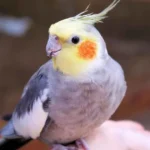Cockatiel fighting refers to aggressive behavior between pet cockatiels. It can involve biting, lunging, or physical attacks. This behavior often stems from territorial disputes, mating issues, or stress. Fighting can lead to injuries and disrupt the harmony of your pet birds’ environment.
Have you noticed your feathered friends squabbling more than usual? It’s time to uncover the root of the problem. Why Are My Cockatiels Fighting? is your guide to understanding and resolving these conflicts. Don’t let fighting ruin your birds’ relationship – act now to restore peace!
Several factors contribute to cockatiel fights, including cage size and layout. Hormonal changes and improper socialization can also trigger aggression. Identifying stress sources is crucial for prevention. Understanding body language and vocalizations helps detect early signs of conflict. With the right knowledge, you can create a harmonious environment for your cockatiels.
Understanding Cockatiel Behavior
Cockatiels are social birds with distinct personalities. They communicate through vocalizations, body language, and feather displays. Cockatiels can be affectionate but may also show territorial behavior. Understanding these basics helps owners interpret their pets’ needs and moods.
Daily routines and environmental factors greatly influence cockatiel behavior. They thrive on consistent schedules for feeding, playtime, and rest. Cockatiels are sensitive to changes in their surroundings. A balanced diet, appropriate toys, and regular interaction are crucial for their well-being.
Common Causes of Aggression in Cockatiels
Cockatiels may become aggressive due to territorial disputes over perches or food bowls. Hormonal changes during the breeding season can also trigger aggressive behavior. Lack of proper socialization or past traumatic experiences can lead to fear-based aggression. Overcrowding in small cages often results in stress-induced fights among cockatiels.
Introducing new birds without proper quarantine can cause aggression in established flocks. Illness or pain may make cockatiels irritable and prone to lashing out. Sudden environmental changes, like cage relocation, can upset birds and lead to fights. Insufficient mental stimulation or exercise can also contribute to aggressive tendencies in cockatiels.
Recognizing Signs of Cockatiel Conflict
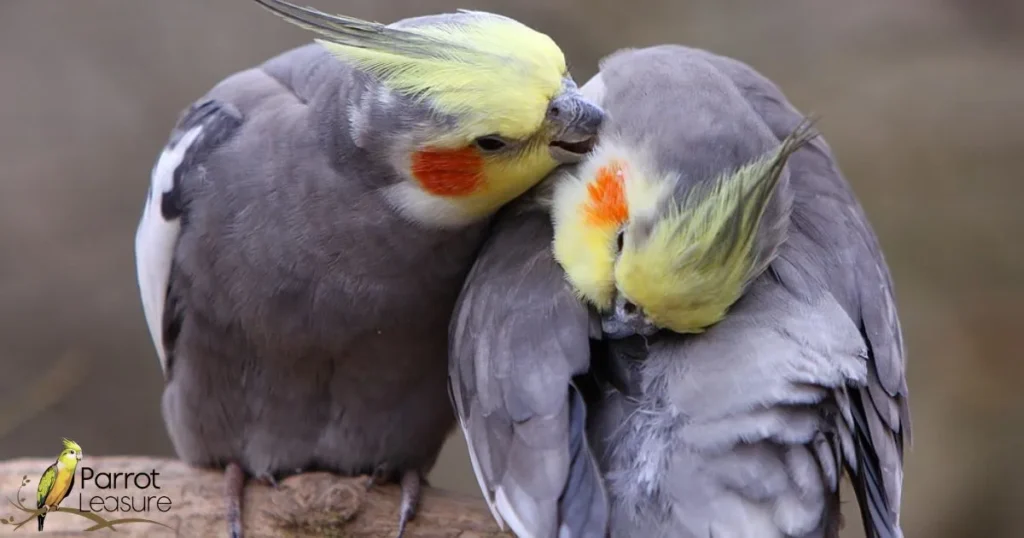
Cockatiels display specific behaviors when conflict arises. Watch for raised crests, fanned tail feathers, and intense staring. Hissing, beak clicking, and loud screeching are vocal signs of aggression. Physical actions may include lunging, biting, or chasing other birds. These signs often precede actual fighting.
Early recognition of these signals is crucial for prevention. Pay attention to changes in body posture and vocalizations. Separate birds if tension escalates to avoid injuries. Consistent observation helps identify triggers and patterns in cockatiel conflicts.
The Role of Territoriality in Cockatiel Fights
Cockatiels are naturally territorial birds. They often claim specific areas as their own, like perches or toys. This instinct can lead to fights when multiple cockatiels share a space. Territorial disputes are common causes of aggression among these birds.
To reduce territorial fights, provide multiple perches and toys. Ensure the cage is spacious enough for all birds. Rearrange the cage layout periodically to discourage fixed territories. Observe your cockatiels closely to identify and address territorial behaviors early.
You May Also Like: Is a Cockatiel a Good Pet?
Hormonal Changes and Their Impact on Cockatiel Behavior
Hormonal changes significantly affect cockatiel behavior, especially during breeding seasons. These shifts can increase aggression, territorial displays, and mood swings. Male cockatiels may become more vocal and protective of their space. Females often experience nesting urges, leading to restlessness and irritability.
Managing hormonal behaviors requires patience and understanding. Adjusting light exposure can help regulate breeding cycles in captive cockatiels. Providing a balanced diet and removing potential nesting sites can reduce hormonal stress. Consistent routines and plenty of mental stimulation help keep hormonal behaviors in check.
Why Are My Cockatiels Fighting?
Cockatiels may fight due to various reasons. Territorial disputes are common, especially in cramped spaces. Hormonal changes during the breeding season can increase aggression. Stress from environmental factors or improper socialization may also trigger fights.
To address fighting, first, identify the cause. Provide a larger cage or separate spaces if needed. Ensure a balanced diet and proper rest to reduce stress. Gradually introduce birds and supervise interactions. If fighting persists, consult an avian veterinarian for professional advice.
Creating a Harmonious Environment for Multiple Cockatiels
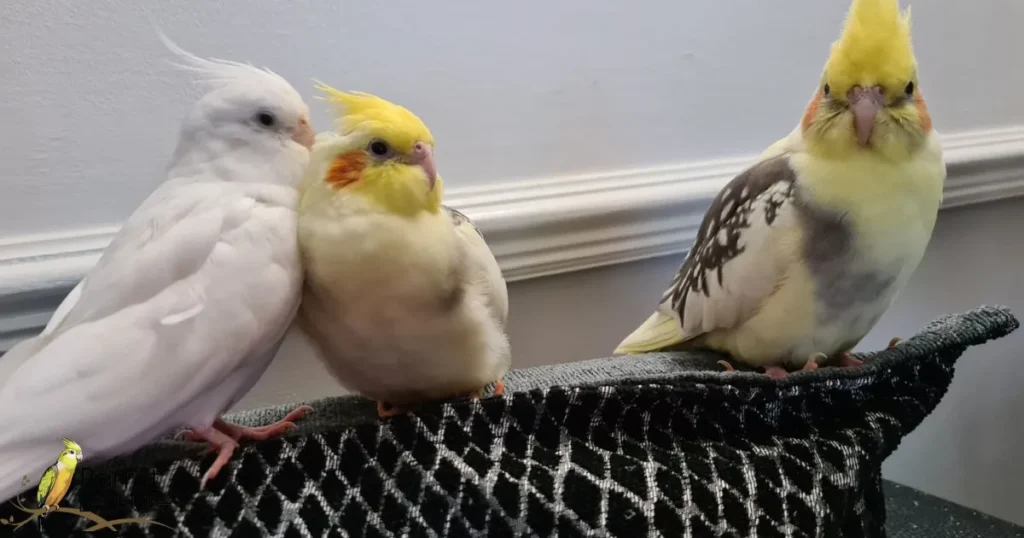
Creating a harmonious environment for multiple cockatiels starts with proper cage setup. Ensure the cage is spacious enough for all birds to move freely. Provide multiple feeding stations and water sources to reduce competition. Offer various perches at different heights to give each bird its own space.
Introduce plenty of toys and enrichment activities to keep cockatiels engaged. Maintain a consistent daily routine to reduce stress. Use room dividers or separate cages if conflicts persist. Gradually socialize birds in neutral territory to foster positive interactions and minimize territorial disputes.
Proper Cockatiel Socialization Techniques
Proper cockatiel socialization starts early in their lives. Introduce young birds to various people, objects, and sounds. Handle them gently and frequently to build trust. Offer positive reinforcement through treats and praise during interactions.
Use a neutral territory for introducing new cockatiels. Supervise initial meetings closely to prevent fights. Provide multiple perches and food sources to reduce competition. Gradually increase interaction time, always watching for signs of stress or aggression.
Stress Factors That Can Lead to Cockatiel Aggression
Cockatiels can become stressed by sudden changes in their environment. Loud noises, new pets, or rearranging furniture may trigger anxiety. Overcrowded cages and lack of personal space often lead to aggression. Limited access to food, water, or favorite perches can also cause stress.
Insufficient sleep due to inconsistent light cycles can irritate cockatiels. Hormonal changes during breeding seasons may increase aggression. Lack of mental stimulation or exercise can result in pent-up energy and frustration. Health issues or pain can also make cockatiels more prone to aggressive behavior.
Intervening Safely in Cockatiel Conflicts
When cockatiels fight, quick but careful intervention is crucial. Approach calmly to avoid escalating the situation. Use a soft cloth or towel to gently separate the birds. Never grab them with bare hands, as this may lead to injury or increased aggression.
After separation, place the birds in separate cages temporarily. Assess them for any injuries that may require veterinary care. Identify and remove potential triggers, such as new toys or perches. Gradually reintroduce the cockatiels under close supervision, watching for signs of renewed conflict.
Promoting Positive Interactions Between Cockatiels
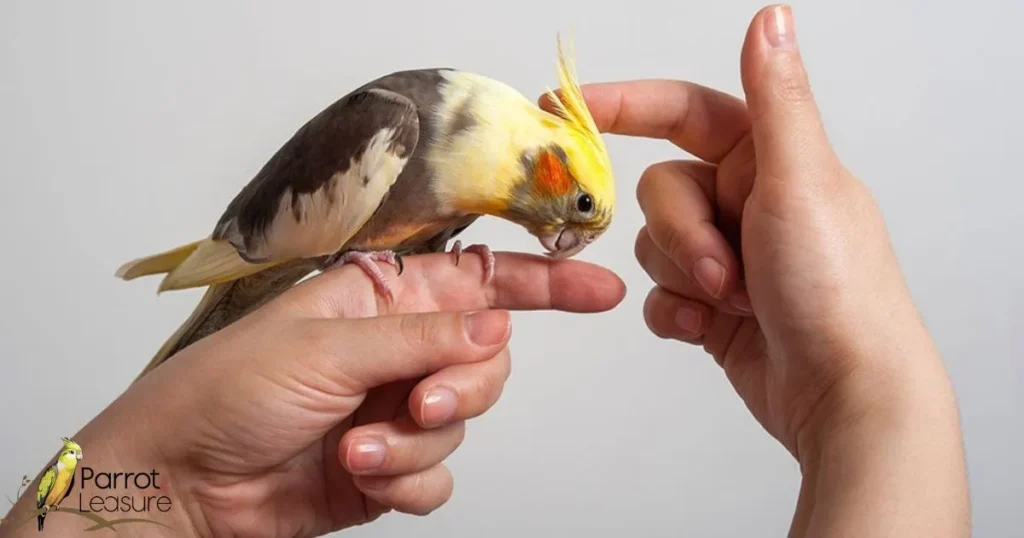
Cockatiels thrive on social interaction. Introduce new birds slowly in neutral spaces. Provide multiple perches and feeding stations. Supervise initial meetings to prevent conflicts.
Offer shared toys and activities to encourage bonding. Use positive reinforcement for good behavior. Ensure each bird has personal space. Maintain a consistent routine to reduce stress and promote harmony.
FAQ’s
Should I let my cockatiels fight?
Sometimes even a bonded pair will fight and you need to separate them temporarily. Sometimes a pair will not stop breeding.
Is it cruel to keep a cockatiel in a cage?
Life in captivity is often a death sentence for birds, who may suffer from malnutrition, an improper environment, loneliness, and the stress of confinement.
How do I make my cockatiel less aggressive?
Using treats and praise will help your pet be more willing to interact with you and it’s much more effective than discipline.
What calms a cockatiel?
Feed them a small treat to get them to stop screaming. Distract them to hold their attention. Turn out the lights for an hour. They will calm down.
How do I get my cockatiel back?
Some bird enthusiasts report having success getting their feathered friend back in its cage by darkening the room. Close the curtains and turn off all lights except a single one next to the cage.
Final Thoughts
Cockatiels fight due to various reasons. Territorial disputes, mating conflicts, or stress can trigger aggression. Address the root cause and provide a peaceful environment to restore harmony. Consistent training and proper care can help prevent future conflicts among your birds.
